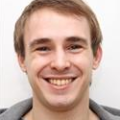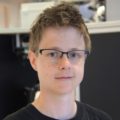Multiscale Structuring for 2-Step Catalysis & Sensing
Joint Doctorate
1st supervisor and 1st promotor: Prof. Alfons van Blaaderen (UU)
2nd supervisor and co-promotor: Associate Prof. Mathieu Odijk (UT)
2nd promotor: Prof. Albert van den Berg (UT)
Affiliation: Utrecht University and University of Twente
Research theme: Catalyst Diagnostics to Develop More Active Catalysts
Structuring heterogeneous catalysts at multiple length scales to enhance performance at multiple levels is at the heart of the MCEC consortium. Here we want to exploit recent advances in the field of microfluidics, where droplets are made on chips, with hierarchical self-assembly (SA). In this project we want to use slowly drying dispersion droplets consisting of two types of nanoparticles to generate submicron sized well-ordered, binary ‘supraparticles’ (SPs) on gram-scale.
Subsequently, we will SA different types of such colloidal SPs into small clusters (e.g. 2, 3 or 4 SPs) with enhanced functionality that stems from the two different types of SPs (also using monodisperse droplets to perform the SA). We will focus on two types of added functionalities made possible by the structuring at several length scales: 1) we want to create SP clusters where a 2-step catalytic reaction can be performed; 2) we will create SP clusters which allow surface-enhanced-Raman-Scattering (SERS) to be enhanced and used on the products of the attached catalytic SP.
These are however examples of applications of a general strategy to create on gram-scale heterogeneous catalysts / sensing platforms using highly parallelized microfluidic sub-micrometer droplet generators used for the first time with dispersions of nanoparticles.
Keywords:
- Self-assembly
- Microfluidics
- Sensing
- Colloids
- Microscopy














